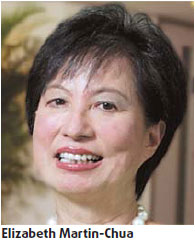

Armed with nearly 30 years of experience in personnel management at Philips, Elizabeth Martin-Chua arrived in China in 2006 as vice president of HR Philips Electronics China to apply her knowledge in managing the multinational electronics giant's 15,000-strong army of employees here.
The greatest challenge she faced was to recruit and keep talented managers and professionals in a marketplace where demand far outstripped supply. In those economic go-go years, job hopping was common among Chinese executives as their income soared.
But many executives at Philips have stayed for more than 10 years, Martin-Chua says, citing her own long career at the company as an example. She joined Philips in 1971.

At Philips, Chua, a Singaporean by birth, says: "we believe in a simple core philosophy" when it comes to personnel management.
The strategy is built on a culture of choosing, evaluating and nurturing talent and making sure all employees have the opportunity to develop themselves within the organization, she said in an interview in Singapore while she was attending the 2008 Singapore Human Capital Summit
A good HR policy and successful management begins from choosing the right talent. At Philips as in many other large corporations, where teamwork is prized over individual daring, an employee's "soft skill" is becoming increasingly important in his or her advancement. Soft skill is about a person's ability to interact with other people, gain the respect of coworkers, and build and maintain good relationship with business associates.
Chua says: "In the recruitment process, I usually spend two, or even three days, with a candidate to test his or her 'soft skills", like a balanced personality, leadership and inter-personal skills, which, I think, are most important. Our employee should have the ability to deal with different relationships with the appropriate skills. If you can do this successfully, you can do any job in any position."
The questions Chua poses to a candidate are usually very specific, allowing her to draw a profile of the candidate's personality, which will be helpful in determining how to develop that candidate's talent.
The HR department of a company should identify the different talent and nurture them in specific ways, Chua says.
Philips also demands that every manager groom a successor who can take over in his or her absence.
"I always ask my managers: 'how about the business if you are not here tomorrow?'" Chua says.
Another way to evaluate employees is to require them to answer 10 questions on a scoring system called champion people group, or CPG. The aim is to find out if they feel confident about fitting into the work environment.
For its non-Chinese work force, Philips considers competency and language as basic skills for a candidate, but the acceptance of Chinese culture is also a priority for a foreigner to work in China, she says. Several years ago, only 30 percent among Philips' employees were Chinese locals, but now the percentage is 70 percent.
"Our target is to have a majority of local talent ... I don't think a company should all be Chinese people or European people, they need a combination, so 70 to 80 percent locals is an ideal pattern," says Chua.
(China Daily 12/29/2008 page6)













